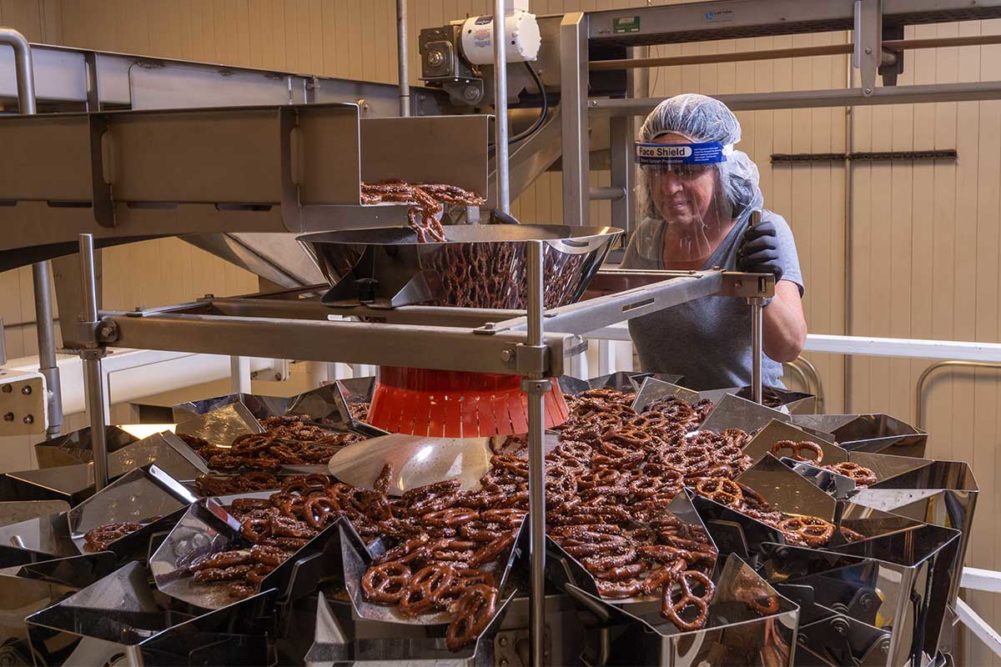In Sosland Publishing Co.’s State of the Baking Industry study, conducted in 2022 by Cypress Research ahead of the International Baking Industry Exposition, bakery respondents to the survey shared how they were addressing the labor skills shortage. Sixty-one percent said they were increasing automation, second only to raising wages as a strategy to address the workforce crisis.
Adding automation not only reduces baking companies’ reliance on labor, but it also has the added benefit of removing repetitive work that today’s employees can find uninteresting or dangerous. While automation also provides production efficiencies and consistent product quality, Spiro Assimacopoulos, president and chief executive officer of The Good Bread Co., Taylor, Mich., sees it as an opportunity to invest in workforce retention.
“Loving what you do makes it easier to get up, go to work and deal with long hours, and ultimately, I want everyone to love what they’re doing in the bakery,” he said. “I think the more intellectually engaged the employee is and the more skill required to perform the job, the more gratifying it is. My goal is to eliminate those tasks in the plant that are not intellectually gratifying and enjoyable for the team member.”
Automating away from repetitive, low-skilled positions also provides more opportunities for advancement. As inflation has put wages and cost of living at the top of many employees’ minds, looking to advance has become even more of a priority.
“I’d like to provide opportunities for team members to move forward economically, and when you’re in a manual labor position, there’s a ceiling to the amount of value you can contribute,” Mr. Assimacopoulos explained. “Automation will provide an ongoing list of opportunities for people to evolve with the organization.”
By replacing these jobs with equipment or software, baking companies will be looking for workers with a higher skill set or training those they already employ to take on more intellectual work. It’s these skills that garner higher wages, but they also require more training.
“Increased automation will require skilled operators who understand and can process data, not just physically do the manual aspects of the work,” said Rob Weber, chief people officer, Hostess Brands, Lenexa, Kan. “There will be much less rote activity in manufacturing, which will require employees to understand more about how the equipment they engage with works. We partner with equipment manufacturers to provide training for operators and develop subject matter experts within our teams.”
According to Hostess Brands’ employee surveys, Mr. Weber said team members frequently ask for more training, an area the company is always trying to improve.
“We currently are investing in a complete redesign of our training methodology, tools and systems,” he said. “Giving new and seasoned employees alike information vital to their success, via modular, digital and interactive approaches, will position them for success.”
When automation is brought into the production process, bakery operators can transition from moving pans around, for example, to monitoring digital controls, becoming professional bakers or moving into maintenance or R&D roles. International Delights, Clifton, NJ, not only relies on equipment manufacturers to help train employees but also internal resources such as the R&D and maintenance departments to help uptrain employees on dough, ingredients and equipment as they transition to these roles that focus more on quality and allow them to be more invested in the product.
“It’s very valuable for retention,” said Josefina Almonte, human resources manager, International Delights. “Employees want to feel proud of where they work, that the work is challenging and allows them to explore new things. They want to experience growth and a path forward.”
When automation is added to a facility, eliminating certain roles, there can be some uncertainty among a bakery’s current workforce even though most baking companies work hard to avoid layoffs and uptrain employees to value-added roles. To assuage fears of change, Mr. Assimacopoulos, who is making major investments in automation at both of The Good Bread Co.’s facilities, said clarity with the staff has been critical.
“We started meeting with employees to give them a framework of what we’re doing and why,” he said. “Ideally, everyone understands and buys into a common goal, eliminating ambiguity, and they understand how these decisions benefit not just the company but also their position and their career.”
This article is an excerpt from the April 2023 issue of Baking & Snack. To read the entire feature on Workforce, click here.






